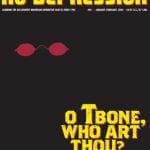Love and Happiness
I Can’t Stop is Al Green’s first album with producer Willie Mitchell, his collaborator on a dozen or so epochal hits for Hi Records in the ’70s, since the two made He Is The Light together in 1986. Their latest project, Green’s first album for Blue Note, isn’t a gospel session like that reunion was, nor is it like the records that have defined his catalog since he entered the ministry more than a quarter-century ago. Yet it would be a mistake to say that the love songs on the album aren’t spiritual, or to characterize them as merely secular, as some writers have. To do so would be to ascribe a soul-body dualism to Green’s music that just isn’t there.
“Love between man and God, between husband and wife, between boyfriend and girlfriend — all love comes from God,” is how Green put it, with a patriarchal, hetero spin, in an interview with Newsweek in 1995. “Life teaches you that it’s difficult to separate ‘I love you’ from ‘I love You,'” he added in a Q&A in a recent issue of The New York Times Magazine. That is, Green’s is an embodied spirituality. He not only views all experience, religious or otherwise, as inherently spiritual; he recognizes that human beings are by nature sexual, and thus sees spirituality as having an erotic dimension.
This emphasis on the interpenetration of the spiritual and the sexual isn’t unique to Green or his music. The liner notes to the soundtrack to The Harder They Come claim that people in Jamaica sing in church until they reach orgasm. Theresa of Avila, the 16th-century saint and mystic, wrote in graphic detail about her “love affair” with God. The commingling of the spiritual and the sexual is also writ large in the music of, among others, Marvin Gaye, Madonna and Prince.
But you’d be hard-pressed to name a rock or soul singer to emerge in the last 30 years who has synthesized — indeed, sanctified — these elements as profoundly or as steadfastly as Al Green has. Just hearing him sustain his climactic, falsetto “aaaah” on “I’m Still In Love With You” or “Let’s Stay Together”, or practically any of his pop hits, is enough to induce the horniest devil to get religion — or to compel even the most self-abnegating ascetic to get busy.
This isn’t to say that the greatest soul singer of his generation hasn’t found living with this tension difficult at times. There is of course the oft-cited incident with the scalding grits that precipitated his call to the ministry. Even more emblematic is 1977’s “Belle”, in which Green, alluding to God while wooing his lover, sings, “It’s you I want, but it’s Him that I need.”
Yet love ultimately isn’t an either/or proposition for Green; it’s not a matter of choosing between God and a lover, but rather of integrating the two. That’s why, when he urges, “Belle, let’s you and I let love come down,” he isn’t merely inviting her to go to bed with him, he’s talking about undergoing sexual healing — about consecrating their love with an anointing from “on high.” “Belle”, with its steamy yet somehow ethereal arrangement pleading right in time, makes a breathtaking case for how intimacy between two people can be a manifestation of divine love and afford us a measure of the transcendence we seek.
These spiritual concerns pervade Green’s “secular” body of work with an almost liturgical resonance. The octave-scaling, melisma-steeped glossolalia toward the end of “Tired Of Being Alone” betrays a hunger for deliverance beyond the precincts of the body. In “Take Me To The River”, Green begs, “Dip me in the water, I want to know/Wash me in the water,” and by the time he’s fully submerged and moans, “Feelin’ good,” there’s no telling where, in this sanctified blues, orgasm ends and baptism begins. On “Love And Happiness”, amid swirls of churchy organ and a testifying choir, he repeatedly gasps, “It’s a power,” bearing witness to love as an ontological force, a source of healing that transcends emotion itself.
“I can’t quit a love like this from consuming you,” Green professes on the title track of his new album, its heartbeat pulse, staccato horns and acerbic strings hallmarks of the sound he and Mitchell perfected at Hi during the ’70s. The record’s expansive centerpiece, “My Problem Is You”, is a “Stormy Monday”-inspired slow-burner that gives a lie to the predicament propounded in its title. “The Answer Is You” is more like it, as Teenie Hodges’ lowdown guitar solo on the bridge attests. The last thing the Reverend wants to do is get over his baby. Or is that Baby?
The rest of the material on I Can’t Stop, all of it cut with singers and players from Green’s heyday at Hi, is rarely as definitive or ecstatic as this (he and Mitchell might have hit more peaks had they availed themselves of at least some outside material). But it’s all good-to-great, and Green is in supple voice throughout — groaning and shouting as sweetly and imperiously as ever, albeit more in the lower registers of his range than he did 25 to 30 years ago.
Ultimately, though, it’s when words and logic fail him that Green’s music achieves its emotional and spiritual resolution — when, with little more than a groove and the inarticulate speech of his heart, he abandons himself to a love that can’t be contained by the likes of “sacred” or “secular.” Indeed, by words of any kind.




